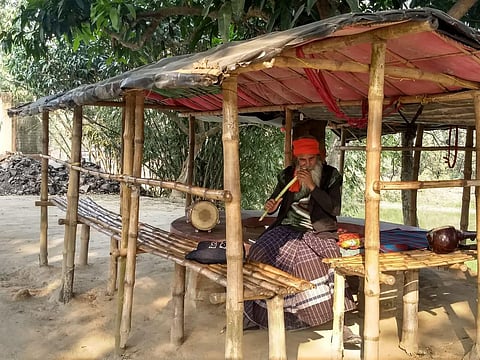

The Bharatiya Janata Party chief JP Nadda in one of his poll rallies proclaimed that 'Under Mamata Banerjee's rule, the rich culture and heritage of West Bengal is under threat.' He asserted only the BJP can now protect it.
The Chief Minister in retaliation said the BJP is trying to break the spine of Bengali culture. Sharpening her attack, she added, "They are trying to hammer Bengali pride, erase our history, change the geographic boundary and taint our political ideology with violence."
In the run-up to the high-voltage West Bengal elections, the word 'culture' and the ethos surrounding it has been at the center of a political slugfest. Kolkata, considered the cultural capital of India, is now the ground zero of this war.
In 2019, it was the violence followed by the desecration of Vidyasagar's bust inside a Kolkata college that had, in the eyes of many political observers, cost the BJP the final phase of Lok Sabha election in the state.
This time around, battered by the relentless 'outsider' jibes from the Trinamool camp, the BJP is doing everything they can to prove they understand the tenets of Bengaliness. There have been notable stumbles though.
Recently, the party's IT cell tweeted that Rabindranath Tagore (the epitome of Bengali's Bhadralok image) was born in Visva-Bharati, much to the BJP's embarrassment. Union Minister Amit Shah also made a faux pas, paying homage to freedom fighter and tribal leader Birsa Munda by putting a garland on his statue, only to realise later that he had planted himself before the wrong bust.
And then there was what could well be termed a 'stagy' moment.
In their efforts to rope in popular faces, both the ruling TMC and Opposition BJP have pitted half the Bengali industry against each other. The saffron party, however, went the extra mile and knocked on Johar Ganguly's door, a popular theatre personality who died in... 1969.
But the BJP knows that chhere dile sonar gour aar toh pabe na. Hence the party is fighting tooth and nail to bring the state into its saffron fold. Amit Shah even embarked on a culinary journey.
During his campaign trail, the home minister had lunch with a Baul family in a remote Bengal village in Birbhum district.
The Bauls are an inseparable part of Bengal's heritage and the latest entrant in the political arena. Interestingly, the Baul Basudeb Das, who played host to the Union Minister, went on to share the stage a few days later with Mamata Banerjee and performed at the TMC rally.
When asked about his stance, Das said, "We are artistes. We don't understand politics and we don't support any party or politics."
The Bauls of Bengal are a group of folk musicians who pursue a life of self-denial and meditative discipline. Popularised by Lalon Shah, the story of the Bauls' origin dates back to the 16th century. Influenced by the Bhakti and Sufi movements, the musicians believe that God is not to be found in religious places, but in the self.
The wandering minstrels are predominantly found in the districts of Nadia and Birbhum, where thousands of them lead a hand-to-mouth existence. Their music often perceived as devotional in nature is usually laced with metaphorical undertones. Draped in shades of saffron, the singers earn a living by performing in stage shows, local trains or at village fairs.
Mansur Fakir, one of the most noted Baul singers in the state, is among those irked by the politicisation of his ilk. He said, "We are mere performers. We should not be dragged into this politics. We perform for everyone, irrespective of caste and creed. If anyone wants us to perform, we will perform. Why are they (parties) trying to divide us along religious lines? We only believe in humanity."
Mansur lives in a small village in Nadia district named Gorbhanga that borders Bangladesh. The village infamous for its marijuana cultivation, houses at least 20 Baul families from marginal backgrounds.
UNESCO in 2005 recognised the Baul tradition as a 'Masterpiece of Intangible Oral Heritage of Humanity'. However, with shows cancelled and trains cancelled (where they sing and beg for money), the pandemic left a permanent dent in their lives.
"We have spent days without food in 2020. I begged wherever we could to get a day's meal. We get Rs 1000 a month from the government but can that feed us for 30 days?" asked Raju Das, a Birbhum-based folk singer.
The Mamata government in 2013 had introduced a Rs 1000 monthly stipend for folk artistes in the state, which was widely welcomed by the community. Mansur, unlike Raju Das, is among those who appreciates the move. "Mamata gave us an identity which the Left or the Congress govt failed to. We love her. We love everyone. Just hope they don't drag us into this mess," he stated.